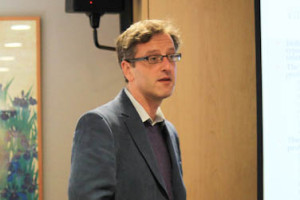Graham Brown, director of the Center for Development Studies at the University of Bath, warned against generalizing regional conflicts as caused by one factor, such as religion or nationality, during a talk Tuesday morning.
Brown said that individuals he called “identity entrepreneurs” often frame conflicts in terms of religious and national identity so that they can mobilize support for their cause. According to Brown, this is a problematic phenomenon because people face a range of “overlapping and intersecting identities to frame their struggle.”
“Looking at the dynamics of conflicts in Asia, when it comes to a choice between selecting a national versus religious identity, there is a payoff matrix,” Brown said, referring to the main theme of his presentation. His talk focused on local conflicts in Southeast Asian regions, such as the Aceh region in Indonesia, the Sabah region in Malaysia and the Moro National Front in the Philippines.

Brown is the 2012 Lee Kong Chian National University of Singapore (NUS)-Stanford Distinguished Fellow at Stanford. The fellowship is awarded to one scholar annually to conduct research at both Stanford and NUS for up to six months.
During his talk, Brown warned against legitimizing or misinterpreting the goals of certain groups of separatists, citing the Filipino group Abu Sayyaf, which he calls “pirates and war profiteers.”
He emphasized the need to distinguish between greed and grievance as causes for conflicts.
“Many times conflicts are not really caused by religion, but then it turns out to be in the process,” he said. “People invent causes and frame them into their identities.”
As a researcher, Brown said one of the fundamental problems is how social scientists conduct their research in the field.
“Political scientists and scholars working on religion face the problem of re-labeling religious conflicts, which feeds into narratives that become accessible to groups [involved in the conflict],” he said.
Citing ethnic conflict in Sri Lanka, Brown argued that scholars such as Samuel Huntington incorrectly labeled the Sri Lankan conflict as a religious one, and thus gave “identity entrepreneurs” the opportunity to manipulate their literature.
Brown further argued the idea of a “relationship between demand and supply and identity,” stating that not all of these identity narratives stick.
“Attempts to ‘Islam-ize’ the Free Aceh movement fall on deaf ears,” he said. “There is something about the nature of Acehnese identity that is strong and cohesive. People know what it means to be Acehnese, and Islam is part of the project, but jihadization isn’t.”
He contrasted this example against that of the Moro National Front in the Philippines, which he said is “a relatively new and deliberately put-together bunch of ethnic groups, and therefore there is a ‘demand’ for more of a ‘jihadized’ identity.”
Donald Emmerson, director of the Southeast Asia Forum at the Walter H. Shorenstein Asia-Pacific Research Center, provided a few comments at the end of the talk.
Even though he agreed with most of the points presented, Emmerson noted, “Identity is not a clinical choice and people can identify with multiple identities and have a choice.”
“I am interested in Islam in Southeast Asia and the idea of Eurarabia and whether or not there is a globalized connection of radicalized Islam,” said audience member Jane Miller Chai ’60.
“The talk was ambitious, but I felt that the idea of Eurarabia was not spelled out clearly,” she added.